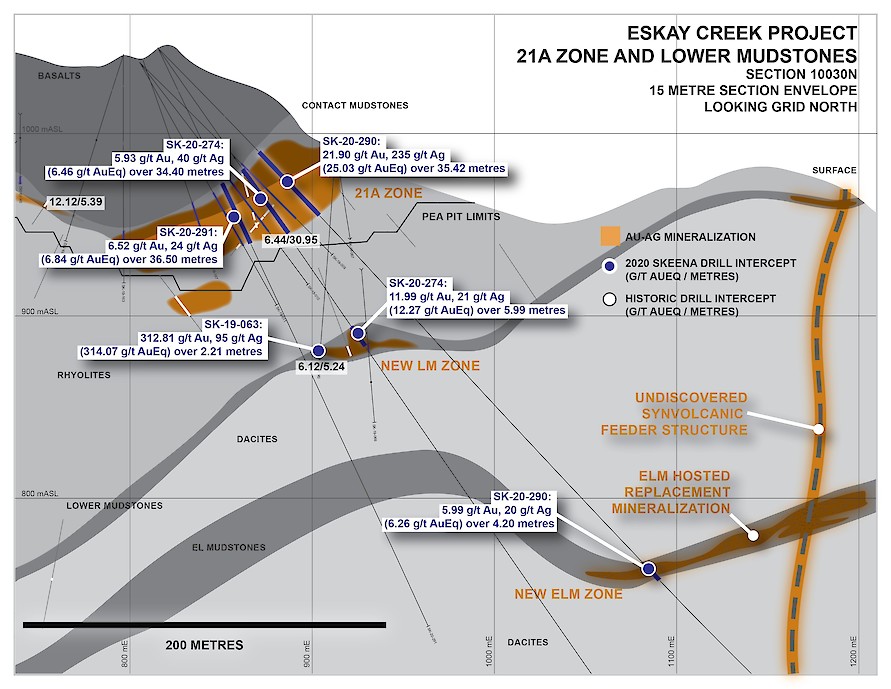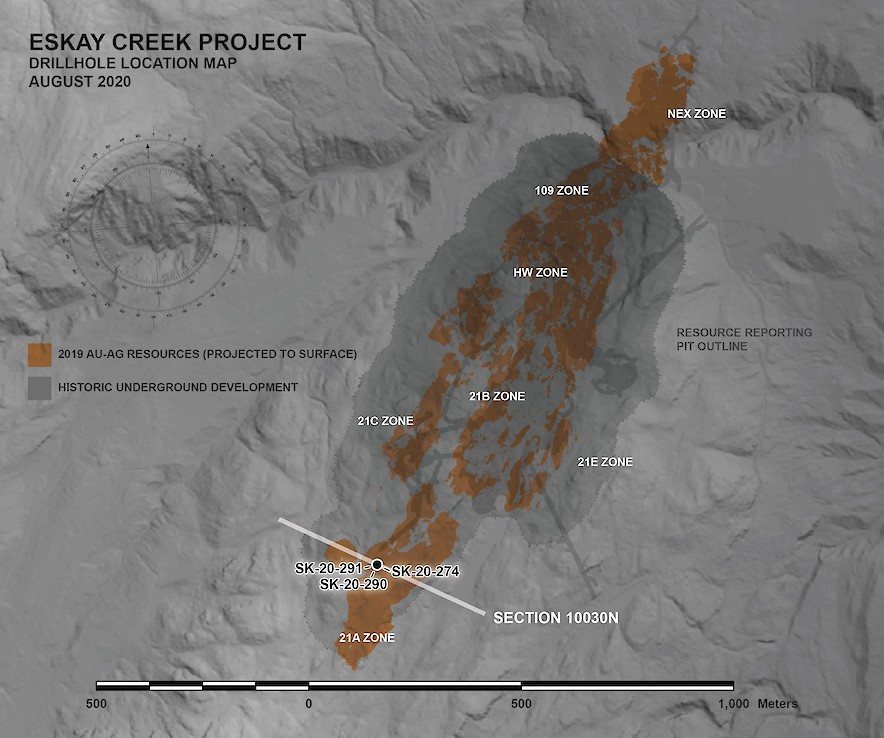NR: 20-23
Vancouver, BC (August 25, 2020) Skeena Resources Limited (TSX: SKE, OTCQX: SKREF) (“Skeena” or the “Company”) is pleased to announce gold-silver drill results from the 2020 Phase I surface drilling program at the Eskay Creek Project (“Eskay Creek”) located in the Golden Triangle of British Columbia. Six ground-based and helicopter supported diamond drill rigs are being utilized for the 2020 Phase I program in the 21A, 21B and 21C Zones for Preliminary Feasibility Study (“PFS”) resource category conversions. Additionally, the Company is also conducting exploratory drilling in the near-mine environment testing the Water Tower Zone (“WTZ”) as well as the largely underexplored Lower Mudstone (“LM”) sequences, which lie beneath the historically mined Contact Mudstone sequences. Reference images are presented at the end of this release as well as on the Company’s website.
Phase I – 21A Zone Infill Drilling Highlights: Excellent grades over substantial thicknesses
• 5.93 g/t Au, 40 g/t Ag (6.46 g/t AuEq) over 34.40 metres (SK-20-274)
• 21.90 g/t Au, 235 g/t Ag (25.03 g/t AuEq) over 35.42 metres (SK-20-290)
• 6.52 g/t Au, 24 g/t Ag (6.84 g/t AuEq) over 36.50 metres (SK-20-291)
Phase I – Exploratory Lower Mudstones Drilling Highlights: New discovery below historic mining
• 11.99 g/t Au, 21 g/t Ag (12.27 g/t AuEq) over 5.99 metres (SK-20-274)
• 5.99 g/t Au, 20 g/t Ag (6.26 g/t AuEq) over 4.20 metres (SK-20-290)
Gold Equivalent (AuEq) calculated via the formula: Au (g/t) + [Ag (g/t) / 75]. Reported core lengths represent 80-100% of true widths and are supported by well-defined mineralization geometries derived from historical drilling. Grade capping of individual assays has not been applied to the Au and Ag assays informing the length weighted AuEq composites. Processing recoveries have not been applied to the AuEq calculation and are disclosed at 100%. Samples below detection limit are nulled to a value of zero.
New Deep Mineralization Discovered in Even Lower Mudstone Below 21A Zone
Three drill holes designed for PFS resource category conversion in the 21A Zone were extended to explore the Lower and Even Lower Mudstone (“ELM”) sequences. This drilling intersected 5.99 g/t Au, 20 g/t Ag (6.26 g/t AuEq) over 4.20 m within a broader anomalous interval grading 3.67 g/t Au, 12 g/t Ag (3.83 g/t AuEq) over 10.50 m in the ELM at a vertical depth approximately 200 m below surface in a previously unexplored area (SK-20-290). This new discovery of discordant, replacement-style mineralization is hosted within an intercalated sedimentary sequence of mudstones and siltstones. Differing from the overlying historically mined Contact Mudstone, this new discovery possesses a different geochemical signature in that there are no significant concentrations of the pathfinder suite of elements (Hg-As-Sb). Drill holes SK-20-274 and SK-20-291 intersected weakly anomalous mineralization in the Lower Mudstones suggesting they are a greater distance from a yet to be discovered synvolcanic feeder and provide support for the geological concept model. The evidence of mineralization in these lower mudstone units, lying below the historically important Contact Mudstone, could represent not only the discordant, crosscutting epigenetic/replacement style, but also needs to be evaluated for the possible presence of stacked predecessor exhalative synsedimentary mineralization events. This new discovery is entirely open for expansion along strike and up-dip and represents a target amenable to underground mining methods.
Additional Mineralization Discovered in Lower Mudstone Below 21A Zone
Phase I drilling has intersected additional mineralization in the LM grading 11.99 g/t Au, 21 g/t Ag (12.27 g/t AuEq) over 5.99 m within a larger interval averaging 6.49 g/t Au, 11 g/t Ag (6.63 g/t AuEq) over 12.94 m (SK-20-274). This mineralization is situated 50 m below the designed PEA open-pit and 25 m up-dip of the previously reported intersection of 312.81 g/t Au, 95 g/t Ag (314.07 g/t AuEq) over 2.21 m including 1,380.00 g/t Au, 322 g/t Ag (1,384.29 g/t AuEq) over 0.50 m (SK-19-063).
Infill Drill Results Demonstrate Grade and Width Continuity
The infill component of the Phase I program continues to confirm the continuity of the modelled mineralization in the 21A Zone as demonstrated by intersection of 21.90 g/t Au, 235 g/t Ag (25.03 g/t AuEq) over 35.42 m (SK-20-290). Further support for the geological concept model are provided by intersections 5.93 g/t Au, 40 g/t Ag (6.46 g/t AuEq) over 34.40 m and 6.52 g/t Au, 24 g/t Ag (6.84 g/t AuEq) over 36.50 m (SK-20-274 and SK-20-291, respectively), which validated the expected resource grades and mineralization distribution.
“This is the first time Skeena has systematically tested the laterally-extensive Lower Mudstone Sequences with exploratory drilling”, notes Paul Geddes, the Company’s Vice President Exploration & Resource Development. “With only three drill holes in a very limited area of the property, we have proven the geological concept model that the LM and ELM, laying below the Contact Mudstone, are mineralized by the same fluids that produced the overlying mining area, and are very prospective. Our ongoing 2020 exploration program will continue to focus on syn-volcanic feeder zones with emphasis on where these feeders intersect all the mudstones, specifically the Lower Mudstones discussed here.”
Skeena’s CEO, Walter Coles Jr. commented, “We’ve drilled 46 holes at Eskay Creek since we restarted our exploration program in July. This press release represents the assay results from only the first three of those holes. In September we intend to add two more drill rigs, which will bring our rig count up to eight. Over the next six months we will have a steady stream of assay results from both infill and step-out exploration holes, which should make for an exciting fall.”
About Skeena
Skeena Resources Limited is a junior mining company focused on developing the past-producing Eskay Creek gold-silver mine located in Tahltan Territory in the Golden Triangle of northwest British Columbia, Canada. The Company released a robust Preliminary Economic Assessment in late 2019 and is currently focused on infill and exploration drilling at Eskay Creek to advance the project to Pre-feasibility. Skeena is also exploring the past-producing Snip gold mine.
On behalf of the Board of Directors of Skeena Resources Limited,

Walter Coles Jr.
President & CEO
Qualified Persons
Exploration activities at the Eskay Creek Project are administered on site by the Company’s Exploration Managers, Colin Russell, P.Geo. and Adrian Newton, P.Geo. In accordance with National Instrument 43-101 Standards of Disclosure for Mineral Projects, Paul Geddes, P.Geo. Vice President Exploration and Resource Development, is the Qualified Person for the Company and has prepared, validated and approved the technical and scientific content of this news release. The Company strictly adheres to CIM Best Practices Guidelines in conducting, documenting, and reporting the exploration activities on its projects.
Quality Assurance – Quality Control
Once received from the drill and processed, all drill core samples are sawn in half, labelled and bagged. The remaining drill core is subsequently securely stored on site. Numbered security tags are applied to lab shipments for chain of custody requirements. The Company inserts quality control (QC) samples at regular intervals in the sample stream, including blanks and reference materials with all sample shipments to monitor laboratory performance. The QAQC program was designed and approved by Lynda Bloom, P.Geo. of Analytical Solutions Ltd., and is overseen by the Company’s Qualified Person, Paul Geddes, P.Geo, Vice President Exploration and Resource Development.
Drill core samples are submitted to ALS Geochemistry’s analytical facility in North Vancouver, British Columbia for preparation and analysis. The ALS facility is accredited to the ISO/IEC 17025 standard for gold assays and all analytical methods include quality control materials at set frequencies with established data acceptance criteria. The entire sample is crushed and 1kg is pulverized. Analysis for gold is by 50g fire assay fusion with atomic absorption (AAS) finish with a lower limit of 0.01 ppm and upper limit of 100 ppm. Samples with gold assays greater than 100ppm are re-analyzed using a 50g fire assay fusion with gravimetric finish. Analysis for silver is by 50g fire assay fusion with gravimetric finish with a lower limit of 5ppm and upper limit of 10,000ppm. Samples with silver assays greater than 10,000ppm are re-analyzed using a gravimetric silver concentrate method. A selected number of samples are also analyzed using a 48 multi-elemental geochemical package by a 4-acid digestion, followed by Inductively Coupled Plasma Atomic Emission Spectroscopy (ICP-AES) and Inductively Coupled Plasma Mass Spectroscopy (ICP-MS) and also for mercury using an aqua regia digest with Inductively Coupled Plasma Atomic Emission Spectroscopy (ICP-AES) finish. Samples with sulfur reporting greater than 10% from the multi-element analysis are re-analyzed for total sulfur by Leco furnace and infrared spectroscopy.
Cautionary note regarding forward-looking statements
Certain statements made and information contained herein may constitute “forward looking information” and “forward looking statements” within the meaning of applicable Canadian and United States securities legislation. These statements and information are based on facts currently available to the Company and there is no assurance that actual results will meet management’s expectations. Forward-looking statements and information may be identified by such terms as “anticipates”, “believes”, “targets”, “estimates”, “plans”, “expects”, “may”, “will”, “could” or “would”. Forward-looking statements and information contained herein are based on certain factors and assumptions regarding, among other things, the estimation of mineral resources and reserves, the realization of resource and reserve estimates, metal prices, taxation, the estimation, timing and amount of future exploration and development, capital and operating costs, the availability of financing, the receipt of regulatory approvals, environmental risks, title disputes and other matters. While the Company considers its assumptions to be reasonable as of the date hereof, forward-looking statements and information are not guarantees of future performance and readers should not place undue importance on such statements as actual events and results may differ materially from those described herein. The Company does not undertake to update any forward-looking statements or information except as may be required by applicable securities laws.
Neither TSX Venture Exchange nor the Investment Industry Regulatory Organization of Canada accepts responsibility for the adequacy or accuracy of this release.
Table 1: Eskay Creek Project 2020 Phase I length weighted drill hole gold and silver composites:
Gold Equivalent (AuEq) calculated via the formula: Au (g/t) + [Ag (g/t) / 75]. Reported core lengths represent 80-100% of true widths and are supported by well-defined mineralization geometries derived from historical drilling. Length weighted AuEq composites were constrained by geological considerations. Grade capping of individual assays has not been applied to the Au and Ag assays informing the length weighted AuEq composites. Processing recoveries have not been applied to the AuEq calculation and are disclosed at 100%. Samples below detection limit were nulled to a value of zero. LM – Lower Mudstone. ELM – Even Lower Mudstone.
Table 2: Mine grid Phase 1 drill hole locations and orientations:



